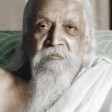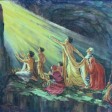recommended
Statistics
Plays Today
0
Plays Yesterday
0
Plays Total
42
Description
In 1966,The Mother asked Sunil Bhattacharya to compose the musical accompaniment for Her readings of Sri Aurobindo’s Savitri. He continued to compose music for Savitri (and for the New Year) till his passing in 1998.
In his compositions for Savitri and for the New Year, Sunilda incorporated chantings of mantras from the Vedas, the Upanishads and various Stavas and Stotras, invoking the diverse Godheads of India. To him, the Mother and Sri Aurobindo were the Supreme as well as all the Goddesses and Gods of Indian mythology. As a result, we often find him replacing the names of the different deities mentioned in the originals with the names of the Mother or Sri Aurobindo.
MANTRAS IN SUNILDA'S SAVITRI MUSIC
SAVITRI BOOK 01 CANTO 03
---------------------------------
1
ॐ धन्योऽहं कृतकृत्योऽहं सफलं जीवितं मम ।
आगतासि यदा देवि ह्रदये परमेश्वरि॥
Om. Blessed am I and verily self-fulfilled and fruitful has become my life
When Thou, O Supreme Goddess, hast entered my heart.
- Source unknown
Translation by Samir Kanta Gupta
2
इदं श्रेष्ठं ज्योतिषां ज्योतिरागाच्चित्रः प्रकेतो अजनिष्ट विभ्वा ।
यथा प्रसूता सवितुः सवायँ एवा रात्र्युषसे योनिमारैक् ॥१॥
रुशद्वत्सा रुशती श्वेत्यागादारैगु कृष्णा सदनान्यस्याः ।
समानबन्धू अमृते अनूची द्यावा वर्णं चरत आमिनाने ॥२॥
आवहन्ती पोष्या वार्याणि चित्रं केतुं कृणुते चेकिताना ।
ईयुषीणामुपमा शश्वतीनां विभातीनां प्रथमोषा व्यश्वैत्॥१५॥
या गोमतीरुषसः सवॅवीरा व्युच्छन्ति दाशुषे मत्याॅय ।
वायोरिव सुनृतानामुदर्के ता अश्वदा अश्नवत् सोमसुत्वा ॥१८॥
माता देवानामदितेरनीकं यज्ञस्य केतुर्बृहती वि भाहि ।
प्रशस्तिकृद् ब्रह्मणे नो व्युच्छा नो जने जनय विश्ववारे॥१९॥
यच्चित्रमप्न उषसो वहन्तीजानाय शशमानाय भद्रम् ।
तन्नो मित्रो वरुणो मामहन्तामदितिः सिन्धुः पृथिवी उत द्यौः॥२०॥
Lo, the Supreme Light of Lights is come ;
a varied knowledge is born in front spreading far and wide.
She is born to give birth to the Sun,
even so night opens her womb for the Dawn.
With her reddening child, the white Mother comes blushing red : the dark Mother flings open her dark chambers.
Both have the same Comrade, both are immortals, they follow each other, as they move measuring out earth and heaven and the hue beyond.
She is the Fosterer, she brings desirable things : and as she awakes, She creates a varied knowledge.
The image of those that are passing endlessly,
the first of those that are manifest, Dawn rises wide refulgent.
Dawns appear, luminous and omnipotent,
for the sake of the mortal who makes the offering.
Even like the God of Life, they bestow as the right impulsions break forth, life's energies ;
and these he enjoys who has the immortal drink purified
O Mother of the gods, the very Army of Aditi, the flaming knowledge of sacrifice, shine forth in thy vastness.
O creator of the perfect expression, manifest yourself in us for the sake of the supreme word :
O All-desirable, bring us to birth in the birth.
The varied work, which Dawns bring forward for him who accomplishes the sacrifice,
who gives the perfect expression —that is the Supreme Good,
That may Mitra and Varuna, and Aditi, and the waters and Earth and Heaven protect us.
- Rig Veda 1.113.1,2,15,18,19,20
Translation by Nolini Kanta Gupta
CWNKG, Vol 5, pp 130-132.
In his compositions for Savitri and for the New Year, Sunilda incorporated chantings of mantras from the Vedas, the Upanishads and various Stavas and Stotras, invoking the diverse Godheads of India. To him, the Mother and Sri Aurobindo were the Supreme as well as all the Goddesses and Gods of Indian mythology. As a result, we often find him replacing the names of the different deities mentioned in the originals with the names of the Mother or Sri Aurobindo.
MANTRAS IN SUNILDA'S SAVITRI MUSIC
SAVITRI BOOK 01 CANTO 03
---------------------------------
1
ॐ धन्योऽहं कृतकृत्योऽहं सफलं जीवितं मम ।
आगतासि यदा देवि ह्रदये परमेश्वरि॥
Om. Blessed am I and verily self-fulfilled and fruitful has become my life
When Thou, O Supreme Goddess, hast entered my heart.
- Source unknown
Translation by Samir Kanta Gupta
2
इदं श्रेष्ठं ज्योतिषां ज्योतिरागाच्चित्रः प्रकेतो अजनिष्ट विभ्वा ।
यथा प्रसूता सवितुः सवायँ एवा रात्र्युषसे योनिमारैक् ॥१॥
रुशद्वत्सा रुशती श्वेत्यागादारैगु कृष्णा सदनान्यस्याः ।
समानबन्धू अमृते अनूची द्यावा वर्णं चरत आमिनाने ॥२॥
आवहन्ती पोष्या वार्याणि चित्रं केतुं कृणुते चेकिताना ।
ईयुषीणामुपमा शश्वतीनां विभातीनां प्रथमोषा व्यश्वैत्॥१५॥
या गोमतीरुषसः सवॅवीरा व्युच्छन्ति दाशुषे मत्याॅय ।
वायोरिव सुनृतानामुदर्के ता अश्वदा अश्नवत् सोमसुत्वा ॥१८॥
माता देवानामदितेरनीकं यज्ञस्य केतुर्बृहती वि भाहि ।
प्रशस्तिकृद् ब्रह्मणे नो व्युच्छा नो जने जनय विश्ववारे॥१९॥
यच्चित्रमप्न उषसो वहन्तीजानाय शशमानाय भद्रम् ।
तन्नो मित्रो वरुणो मामहन्तामदितिः सिन्धुः पृथिवी उत द्यौः॥२०॥
Lo, the Supreme Light of Lights is come ;
a varied knowledge is born in front spreading far and wide.
She is born to give birth to the Sun,
even so night opens her womb for the Dawn.
With her reddening child, the white Mother comes blushing red : the dark Mother flings open her dark chambers.
Both have the same Comrade, both are immortals, they follow each other, as they move measuring out earth and heaven and the hue beyond.
She is the Fosterer, she brings desirable things : and as she awakes, She creates a varied knowledge.
The image of those that are passing endlessly,
the first of those that are manifest, Dawn rises wide refulgent.
Dawns appear, luminous and omnipotent,
for the sake of the mortal who makes the offering.
Even like the God of Life, they bestow as the right impulsions break forth, life's energies ;
and these he enjoys who has the immortal drink purified
O Mother of the gods, the very Army of Aditi, the flaming knowledge of sacrifice, shine forth in thy vastness.
O creator of the perfect expression, manifest yourself in us for the sake of the supreme word :
O All-desirable, bring us to birth in the birth.
The varied work, which Dawns bring forward for him who accomplishes the sacrifice,
who gives the perfect expression —that is the Supreme Good,
That may Mitra and Varuna, and Aditi, and the waters and Earth and Heaven protect us.
- Rig Veda 1.113.1,2,15,18,19,20
Translation by Nolini Kanta Gupta
CWNKG, Vol 5, pp 130-132.
Categories





